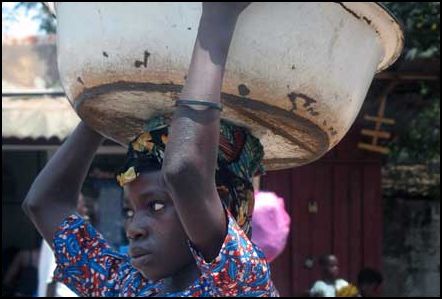
Photo courtesy of Baba Blankets
One Woman's mission to help the Women of Africa
by Lilo Bowman
The greatest change often comes when one person decides to follow their dream. Names such as Ghandi or Martin Luther King represent the epitomy of this idealism. Often it only takes that individual's unending will and determination to make a significant impact in the lives of others. While in Houston for the recent Quilt Festival we met Aminata Brown, founder of Baba Blankets, and learned of the incredible journey she had taken in her effort to help the women of Ghana to be independent and self supporting members of society.
Brown had always dreamed of living in West Africa. Even as a child she felt this strong pull to live across the globe, but had no idea that she would one day be living in a part of the world that she had so often longed for. As a college undergraduate she worked in Dakar, Senegal for ten month to teach english to middle and high school students. She returned to Brown University to complete her degree in Literature and African Studies, but always with the intention of returning to West Africa as soon as financially possible. After graduation work as a management consultant allowed her to save with the majority of her income for her "Africa Nest Egg". After four years she finally had saved enough, and with the prospect of work in Ghana as an entrepreneurial business consultant she thougt her dream had come true. But life had another plan in mind for Brown.
She soon discovered that working with a laptop in an office was not as fullfilling as she thought, even though she was living in Africa. She did not feel that she was playing an active part in the community. It was while she was walking through the enourmous market of Accra one day that she met the "kaya yo"; impoverished young women who act as load carriers from sunrise to sunset and receive a very minimal wage for this back breaking work (learn more about the women in the market here). As the women usually come from villages many miles from Accra, they are without the support of family and thus are forced to live and sleep on the streets of the market under conditions that are unsanitory and often dangerous. Meeting with a number of these women Brown asked them what their dreams were. An overwhelming number said that they would like to learn to sew. "I was struck by the humble nature of that dream," says Aminata, who respected the women for working hard instead of asking for hand outs. It was from this dream shared by an overwhelming number of the women that an idea took shape. A studio would be found where the women would learn to sew and earn a wage. There was only one problem, Brown didn't know the first thing about sewing.
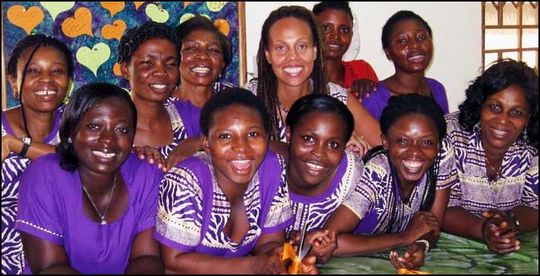
Photo courtesy of Baba Blankets
Accra, Ghana was colonized by the British which came in handy as Brown scoured the city in hopes of finding someone who could teach the women to sew. Tailoring is considered a highly skilled craft in Accra, so Brown hired tailors and seamstresses to teach the initial group of women how to do the most basic of sewing. Using her savings she purchased fabrics, dyes, and sewing machines. She opened the first studio cooperative in the market amongst the rats, crime, and open sewage on a daily basis. "We were creating beautiful items from this horrible place. Beauty can truly come from within each of us." During these trying times she was on a daily basis encouraged and inspired by the courage and strength that these women exhibited. They began creating items using locally produced fabrics while at the same time encouraging the women to design the patterns for the throw blankets and table cloths they were producing. They were off and running. By the end of the year they had sewn three hundred blankets. But how to sell them, and where? Again, Brown had no idea of how she was going to sell these items that would support the women who depended upon her.
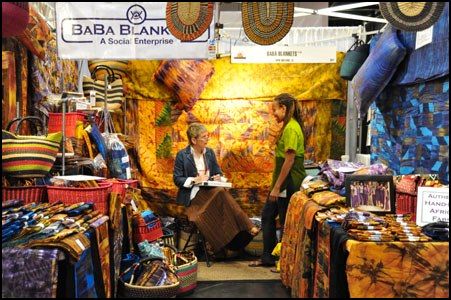
Photo courtesy of Baba Blankets
Brown returned to San Francisco and opened an art studio on a retired military base. Overwhelmed by the number of blankets and no idea what to do next she decided to write press releases about her endeavor and sent them out to all major newspapers, not sure if any would respond. She was thrilled when she was asked to be in the 1st Crossroads Cafe Art Show. That weekend the San Fransisco Chronicle devoted an entire front page in the arts section about Brown and the work she was doing in Ghana. When she returned from the show her phone never stopped ringing. Others were excited and supported her dream.
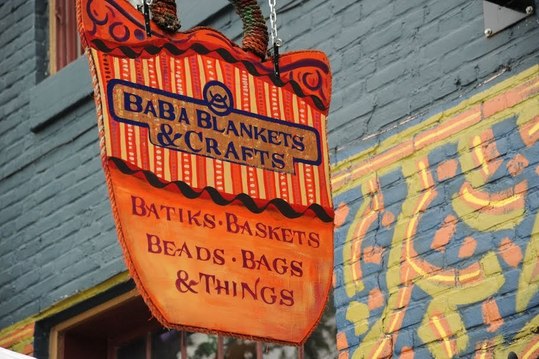
Photo courtesy of Baba Blankets
Fast forward to 2007 when Brown was asked to be a guest artist at the New Orleans Jazz Fest. The celebration that year was honoring the country of Ghana. Brown fell in love with New Orleans and the people of and in 2008 decided to move her operation there. It was in December of that year that she opened the store, Baba Blankets and Crafts named after the project Baba Blankets. Baba is a term of honor and respect given to a nurturing and guiding individual. The store features a range of items made by the women of the cooperative as well as other hand crafted items from Ghana that directly support the artisans. Along with the store in New Orleans, Baba Blankets has a web shop. To learn more about Baba Blankets and its mission click here.
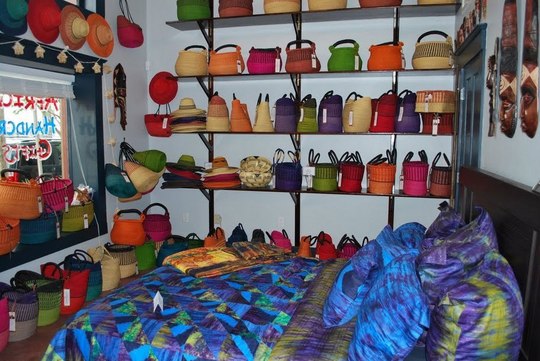
Photo courtesy of Baba Blankets




.jpg)


